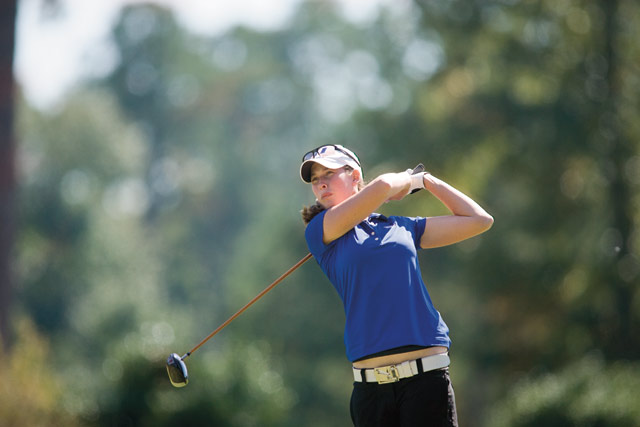It’s a balmy, sun-drenched afternoon in late January, the kind of day when golfers will skive a couple hours to play a round or two. But up in the study room of the Karcher-Ingram Golf Center—a stately facility behind the Washington Duke Inn that serves as home base for the Duke golf teams—sophomore Laetitia Beck isn’t even looking outside. Instead, she is poring over a psychology textbook, her white earbuds buzzing with the sounds of pop music from her other home, Israel.
Beck moved to Israel from Belgium with her family when she was six. Her parents, who enjoyed playing golf recreationally, moved to Caesaria, the only city in Israel with an eighteen-hole golf course. They soon discovered their daughter had a natural talent for the game. She won her first Israeli Golf Open at the age of twelve, setting her on a path defined by golf. At fourteen, she left Israel for the prestigious IMG Academies in Florida, where she attended boarding school while working on her game. Last August, she qualified as an amateur for her first Ladies Professional Golf Association event, becoming the first Israeli to play in the LPGA.
But it’s not hard to imagine Beck’s life going a different way. Just look at her twin sister, Olivia.
While Laetitia Beck works on her putting, Olivia Beck collects border-surveillance information for her unit in the Israeli army. Completing compulsory military service is a rite of passage for Israeli youth, and it is in many ways hard for Laetitia to miss it. When Olivia completed basic training and received a beret marking her entry in the Field Intelligence Corps, Laetitia admits she was jealous. Yet she knows she is representing her country, too, in her own way. “My number one goal is to represent my country and the Jewish people,” Beck says.
Last August, she qualified as an amateur for her first Ladies Professional Golf Association event, becoming the first israeli to play in the LPGA.
But Beck has long been both a part of Israel and apart from it. After her victory at the Israeli Golf Open, her parents and coaches explained she had to commit to the sport if she truly wanted to excel. With so few highly competitive golf players in Israel, she knew she would have to leave home to become the player she thought she could be.
In Florida, Beck faced a host of trials. At home she spoke mostly French and Hebrew, and she struggled to speak English exclusively. With no family in the U.S., she ended up spending a lot of time alone, focusing on her game, but losing contact with her few remaining Israeli friends. Her golf game was being noticed by college coaches, but she knew little about American universities.
“I didn’t really know what college was, about unofficial letters, about the whole process, so I committed early,” she says. Back in Israel, she completed required military examinations and applied to postpone her service until after she finishes her golf career.
“The golf program here is great, and I know that I’m getting a good education at the same time. The Duke degree really means something,” she says.
Nearing the halfway point of her college years, she says she’s still working on her game—both athletic and social. Like many student-athletes, she finds her friends are mostly people on sports teams, who share the same regimented schedules. Her roommate, Hannah Mar, is a sophomore on the tennis team and a former gold medalist at the Maccabi Games in Israel.
“I know I’m kind of different from students here. I don’t want to go out partying and all that goes with it—I just want to play sports,” says Beck. “But it’s hard to meet new people when you don’t have the same schedule.”
It can be tough, being stuck between two homes. She laments that her Hebrew has grown rusty, and she doesn’t know many people in Israel anymore, except through her sister. Someday, when golf is done, she hopes to return.
For now, though, there is homework to do. Beck shrugs off her bit of melancholy and turns instead to her first assignment for her “Introduction to Visual Practice” course, six hand-drawn variations of a wolf. She’s thinking of giving the wolf a blue eye. It’s the color of her twin lives, the blue-and-white of Duke, the blue-andwhite of Israel. As she puts it, “Now I play for Duke, but when I’m not, I’m wearing the Israeli flag."

Share your comments
Have an account?
Sign in to commentNo Account?
Email the editor